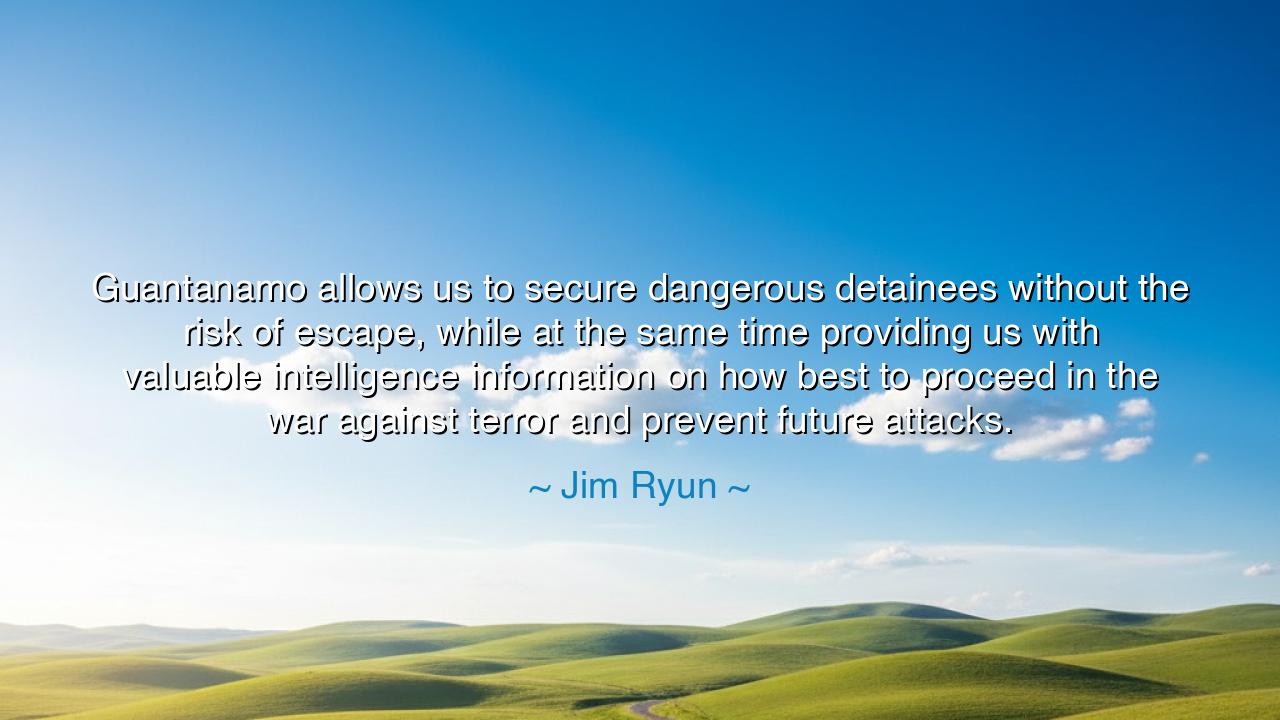
Guantanamo allows us to secure dangerous detainees without the
Guantanamo allows us to secure dangerous detainees without the risk of escape, while at the same time providing us with valuable intelligence information on how best to proceed in the war against terror and prevent future attacks.






“Guantanamo allows us to secure dangerous detainees without the risk of escape, while at the same time providing us with valuable intelligence information on how best to proceed in the war against terror and prevent future attacks.” — Jim Ryun
Hear these words, O listeners of history and keepers of memory, for they speak from an age of fire and fear—a time when the world trembled in the shadow of unseen enemies. When Jim Ryun, a man of public trust, uttered these words, he spoke in the aftermath of great calamity—the September 11th attacks, when towers fell and nations reeled. His words sought to give reason to the building of Guantanamo Bay, a prison beyond the ordinary laws of men, a fortress of vigilance where those deemed dangerous detainees were confined. His was a voice among many who sought to justify that place as both shield and sword: a citadel of security, and a well of intelligence in the dark war against terror.
To understand his words, one must first remember the fevered heart of that era. The world was not calm—it was shaken. The powerful feared the invisible; the innocent feared the next dawn. Out of that fear was born the will to control, to prevent, to contain. The Guantanamo facility, set upon foreign soil yet under American hand, was crafted to hold those captured in distant deserts and cities—men accused of plotting ruin upon the free world. It was built as a place where escape was impossible, where secrecy would cloak the state’s actions, and where information—however painfully gathered—might save future lives. Thus, to Ryun and others, Guantanamo became not merely a prison, but a fortress of protection and intelligence.
But as the centuries have taught, every fortress built in fear becomes also a mirror of conscience. For though the intent was safety, the cost was moral. The ancients, too, knew this peril. Consider Rome, when faced with conspirators against the Republic. In their zeal to preserve order, the Senate passed the Senatus Consultum Ultimum, granting absolute power to defend the state. And though the conspirators were crushed, so too was Rome’s innocence. Liberty was wounded by the hand that sought to save it. The same danger echoes in Guantanamo: that by securing the realm, one may endanger the soul of the realm itself.
Yet in Ryun’s statement lies not malice, but a reflection of the eternal human struggle—the balance between security and freedom, between justice and necessity. He speaks for the protector’s burden, for those who must decide not in calm but in crisis. For what ruler, what soldier, what leader has not faced this dilemma: to act harshly now, or risk devastation later? The ancients called this the tragedy of governance—the knowledge that even righteous actions may bear bitter fruit. Guantanamo, in this sense, became both shield and scar: a testament to man’s will to survive, and his capacity to err in that pursuit.
We must not judge too swiftly, nor justify too easily. The wise know that in the war against terror, as in all wars, the greatest danger is not the enemy without, but the blindness within. For when fear becomes our master, even noble hearts may stray from virtue. The intelligence gained through coercion may reveal secrets, yet at what price? The security achieved through confinement may preserve lives, yet what becomes of the soul that learns to justify cruelty for safety’s sake? These questions do not accuse—they remind. They are the whisper of wisdom to the roaring of fear.
Therefore, take this lesson, O guardians of the future: when you build walls in the name of protection, build also windows for truth and compassion. Security must walk beside ethics, and intelligence must serve justice, not replace it. Learn from the mistakes of every age—that to preserve freedom, one must not destroy its foundations. The wise leader, like the careful blacksmith, tempers his blade; he strikes not in haste, but with purpose. So too must nations temper their power with conscience, and their vigilance with mercy.
For the measure of a civilization is not in the strength of its prisons, but in the integrity of its principles. And the war against terror, though born in fire, can only end in light if we remember that victory without virtue is defeat in disguise. Thus, from Jim Ryun’s words, take not only the call to secure, but the call to reflect. Let every generation ask itself: How do we defend ourselves without losing ourselves? For only by guarding both the body and the soul can a people remain truly free.






AAdministratorAdministrator
Welcome, honored guests. Please leave a comment, we will respond soon